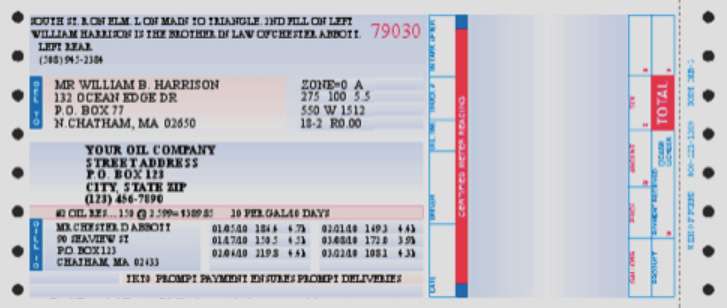Heating Oil Delivery
An oil "ticket" is the receipt that the oil company uses to record the quantity of oil dispensed at each delivery. An oil truck’s pump has a meter that measures how much oil is being dispensed, similar to the meters found on gas pumps at gas stations. When the driver finishes pumping your oil, the meter prints the quantity directly on the ticket. The driver leaves one copy of the ticket in your mailbox and keeps another copy for the company’s records.
Example heating oil ticket

Many states require oil companies to provide paper oil tickets, while some states allow homeowners to opt in to receive electronic tickets instead of paper ones.
Automatic heating oil delivery means that your heating oil company uses special software to estimate your oil usage and schedules deliveries when the software indicates that you are likely running low. Homeowners often choose automatic delivery with a 1-year oil delivery contract, but many companies offer it without a contract. The benefit of automatic delivery is the convenience of never having to check your oil gauge. However, the drawback is that you may not always get the best prices, as you can't price-shop for each delivery.
"Will-call," "COD fuel company," and "cash heating oil order" are terms that all refer to the same process: the homeowner periodically checks their oil gauge and places a heating oil delivery order when they are running low.
Heating Oil Pricing Plans & Payment Plans
- Floating (a.k.a. "Market Price") Plan: The price per gallon is determined either on the day you place the order (for on-demand oil orders) or on the day of delivery (for automatic delivery).
- Fixed Price Plan: A price per gallon and a number of gallons are quoted on the day you sign the 1-year contract. This is the price you pay for the duration of the contract. If your oil usage exceeds the quoted number of gallons before the contract expires, you automatically switch to a floating plan for the remainder of the contract.
- Price Protection (a.k.a. "Capped Price") Plan: A maximum price per gallon and a number of gallons are quoted on the day you sign the 1-year contract. For the length of the contract, on the day of each oil delivery, your oil company's floating price per gallon is compared with your quoted maximum price per gallon, and you pay whichever price is lower. Price protection plans include either a one-time fee paid at the beginning of the contract or a per-gallon fee that is incorporated into the price per gallon you pay.
- Prepay: Pay for each oil delivery at the time you place an order. This is common for on-demand orders.
- Post-pay: Pay for each oil delivery after you receive it. The company either sends you a bill, or, if your bank account or credit card is on file, the company automatically debits the payment. This is common with automatic delivery.
- Budget Payment Plan: Your oil company estimates your total heating oil cost for the upcoming year, divides that amount by 12, and sends you 12 equal monthly bills. The final month's bill is adjusted to account for any difference between the forecasted and actual costs. While the most typical budget payment plan is 12 months, 10- and 11-month plans are also available.
Many full-service heating oil delivery companies offer both pricing plans and payment plans, so it's important to understand the distinction.
- Pricing Plans determine the price per gallon of oil that you pay. Examples include "floating," "fixed," and "capped" pricing plans.
- Payment Plans determine when you make payments for heating oil. Examples include "prepay," "post-pay," and "budget" payment plans.